Pacifica Rebels Turn Up Volume
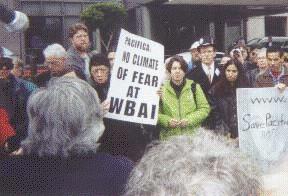
by John Tarleton
March 2001
HOUSTON, Texas—Valerie van Isler came to the Pacifica National Board's spring meeting with a wooden plaque cradled under her right arm.
Two years earlier the board had awarded her a special commendation for her work as general manager at WBAI in New York. During van Isler's tenure, the listener-sponsored station had balanced its books with record-setting fundraising drives, won numerous journalism awards with shows like Democracy Now! and successfully completed a million dollar capital campaign that allowed the station to move into a new facility with a stable, long-term lease.
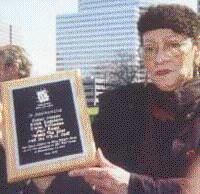
"I did everything that was asked of me," she said.
In February, the plaque honoring van Isler's achievements was found in a dumpster behind WBAI, left there by van Isler's successor. If van Isler had tried to re-enter the station where she worked for 22 years, she would have been arrested. She was one more casualty in Pacifica's ongoing civil war.
Power Struggle
Pacifica has been making a lot of enemies, like van Isler, of late. Launched in 1949 by Lew Hill, a WWII conscientious objector, the listener-sponsored Pacifica Network has long been a bastion of left, alternative thinking. It has five FM stations in New York, Los Angeles, Washington, D.C., Berkeley and Houston that are capable of reaching 22% of the US population.
In recent years, Pacifica has been engulfed in a protracted power struggle between a national board that wants to move the network toward more upscale mainstream programming and grassroots activists who insist Pacifica remain faithful to its original mission. The network's leadership, which recently moved its headquarters from California to Washington, D.C., is strongly supported by the quasi-governmental Corporation for Public Broadcasting (CPB), which supplies 15% of Pacifica's funding.
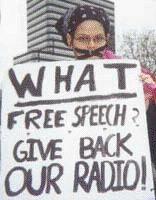
Hundreds of Pacifica employees and volunteers at the five stations have been fired or banned over the past decade. Houston's Pacifica station (KPFT-90.1 FM), which once aired a diverse fare of programs in eight languages, now plays music 80% of the time, according to Duane Bradley, KPFT program director from 1987-89.
Pacifica's flagship station, KPFA in Berkeley, was shut down and put under armed guard for 23 days in July/August 1999 while thousands gathered outside to protest the board's crackdown on the station. The most recent flare-up was a December 23 "Christmas Coup" at WBAI in which van Isler and eight longtime programmers, producers and volunteers were sacked by Bessie Wash, Pacifica's executive director, and Utrice Leid, the afternoon talk show host who assumed van Isler's position.
If Pacifica's leaders thought they could lay low in Houston, they guessed wrong. Their March 3-4 board meeting was besieged as several hundred media activists from Houston and around the country took part in a tumultuous weekend of protests, rallies, teach-ins and walkouts.
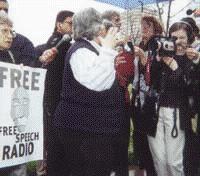 Corporate liberals and grassroots radicals faced off in the basement of an upscale hotel near the Galleria shopping center. And it was the liberals who blinked first. Board member John Murdock (of the union busting law firm Epstein, Becker & Green) tabled his proposed by-law changes that would have further centralized power in the hands of the national board, allowing an inner circle of five board members to sell off stations (WBAI alone is valued at $150-200 million) and personally profit from the transactions.
Corporate liberals and grassroots radicals faced off in the basement of an upscale hotel near the Galleria shopping center. And it was the liberals who blinked first. Board member John Murdock (of the union busting law firm Epstein, Becker & Green) tabled his proposed by-law changes that would have further centralized power in the hands of the national board, allowing an inner circle of five board members to sell off stations (WBAI alone is valued at $150-200 million) and personally profit from the transactions.
"What Mr. Murdock was saying was, 'we didn't mean to do that'," said dissident board member Ron Robinson of Washington, D.C. "The subtext of that was, 'we certainly didn't mean to do that if it was going to turn out so badly'."
Murdoch's retreat was not enough. During public comment periods on both the 3rd and the 4th, angry listeners and ex-staffers repeatedly called on board members to resign.
"This is the first organization that I've been arrested by that I donated money to," said Howard Brandstein of New York City, one of nine members of WBAI's LAB (Local Advisory Board) who was arrested in January while attending a meeting at the station. "…(And) when an organization has to arrest its own donors, it's on the wrong side of history."
"Three Deep Breaths"
Pacifica's board is deeply divided. While six dissident board members call for Pacifica to be returned to local control, the majority of the board's 17 members insist on continuing with a "Strategic Five Year Plan" to transform Pacifica even as they face growing grassroots opposition and three separate lawsuits by listeners, LABs and fellow national board members.
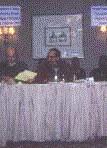 The board's leaders deploy the language of multiculturalism and project the soothing tones of grounded New Age leadership. Michael Palmer, chair of the finance committee, is a large, soft-spoken man with a bald head. He broke up one heated exchange on Saturday afternoon by gently admonishing all parties to "take three deep breaths". Palmer is also the Vice President of a Houston firm (CB Richard & Ellis) that brokers commercial real estate to companies that build low-wage maquiladoras on the Texas-Mexico border.
The board's leaders deploy the language of multiculturalism and project the soothing tones of grounded New Age leadership. Michael Palmer, chair of the finance committee, is a large, soft-spoken man with a bald head. He broke up one heated exchange on Saturday afternoon by gently admonishing all parties to "take three deep breaths". Palmer is also the Vice President of a Houston firm (CB Richard & Ellis) that brokers commercial real estate to companies that build low-wage maquiladoras on the Texas-Mexico border.
Many of the board's influential members (John Murdock, Bertram Lee, Ken Ford, et al.) are well-to-do African Americans. Over the weekend, they repeatedly claimed to be victims of racism. Juan Gonzalez, former co-host of Democracy Now! strongly disagrees.
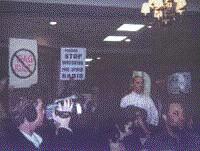 "A group of neo-liberal oriented folks have gotten together with a bunch of comprador African-Americans to throw smokescreens up while they do a classic corporate grab of the Pacifica Network," Gonzalez said. "Anybody with any sort of small understanding of how race has been used in American society can see through this scam. We have to confront it head on."
"A group of neo-liberal oriented folks have gotten together with a bunch of comprador African-Americans to throw smokescreens up while they do a classic corporate grab of the Pacifica Network," Gonzalez said. "Anybody with any sort of small understanding of how race has been used in American society can see through this scam. We have to confront it head on."
Direct Action
Saturday's simmering frustrations erupted at Sunday morning's meeting, which had been moved upstairs to a more spacious ballroom. The topic was WBAI and the Christmas Coup. Bessie Wash took responsibility saying it was a "progressive disciplinary action". Dissident board members grilled her. Then, the floor was opened for public comment. While Wash and Utrice Leid slipped out the door, Janice K. Bryant, a banned WBAI producer, waited at the back of the line of with a prepared statement in hand.
Activists headquartered on the 12th floor of the Doubletree had stayed up until early Sunday morning preparing a "direct action" that would be their parting message to the board. When Bryant finished her statement, most of the people in the audience simultaneously turned their backs on the board and began loudly chanting ("Resign Now! Resign Now!"... "Democracy Now! Democracy Now!"..."Whose Network? Our Network! Whose Network? Our Network!"...) with fists in the air. Then, they began serenading ("Nah-nah-nah-nah. Nah-nah-nah-nah. Saaaaaay Gooood-bye") the stunned board members before eventually walking out of the hotel. There were no arrests.
Buoyed by the action, 50-60 activists met all afternoon at the Leisure Learning Center to lay the groundwork for a coordinated national resistance to the Pacifica National Board. "The collaboration between the activists from New York City and the four other signal areas was a good sign," said Andrea Buffa, director of the San Francisco based Media Alliance. "...The board opened up a whole new front when they attacked WBAI. They brought together people in New York and California like we hadn't been able to do before. And, we intend to go forward with that like gangbusters."
What Next?
Right now activists are focused on a common enemy: the Pacifica National Board. But if this uprising should prevail, the insurgents will face the daunting challenge of defining what exactly they are fighting for.
Do they want to put in place another self-selecting group of leaders-only this time hipper and more progressive? Or, do they want to truly empower the listeners who, after all, sponsor the network? If so, what would a radically restructured Pacifica look like? Will listeners, staff, and LAB members be able to find common ground? Or, will they fall on each other with the same intensity with which they have attacked the national board?
Also, like all despotic regimes, Pacifica's board has encouraged and rewarded staffers who collaborate with their atrocities. What to do with collaborators-leniency or a swift wave of counter purges? And what will be said of those radical journalists who knew what was up but adhered-on pain of being "terminated"-to Pacifica's gag rule which forbids on-air discussion of the network's internal affairs? Can people forgive each other for not being heroic?
Ousting Pacifica's corporate friendly national board will be the first and perhaps the easiest step on the long road to democratizing Pacifica.
LINKS:
Save Pacifica
Radio4All
Pacifica Campaign
Pacifica Listeners Union
Official Pacifica Web Site
Back to "Whose Network? Our Network!": Voices of the Free Pacifica Movement
Back to On the Road with John Tarleton
This story appears in the April 2001 Houston Peace News.